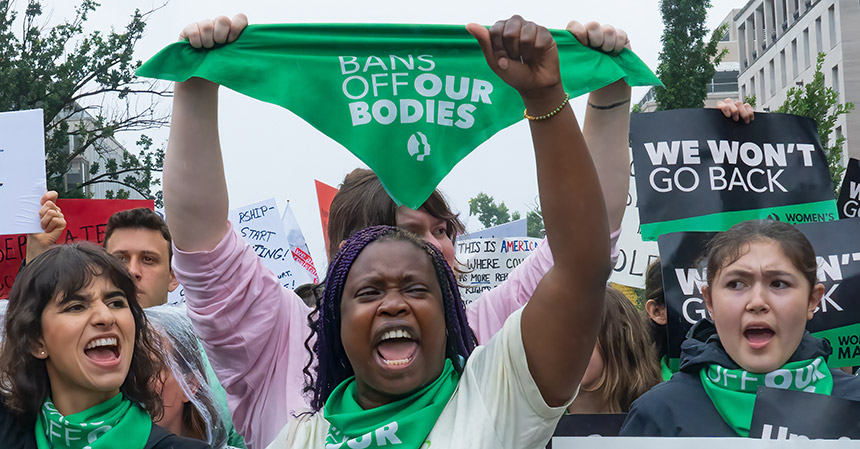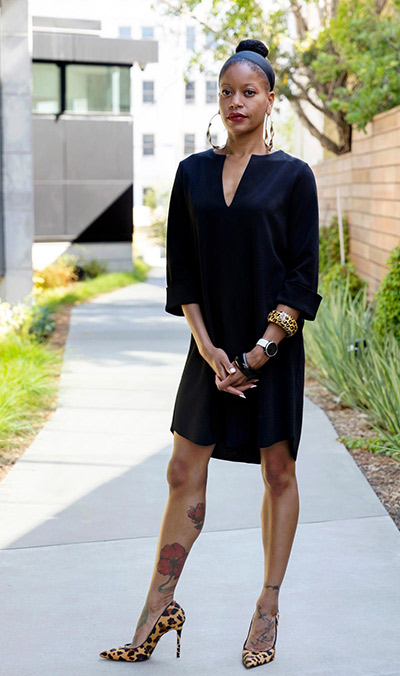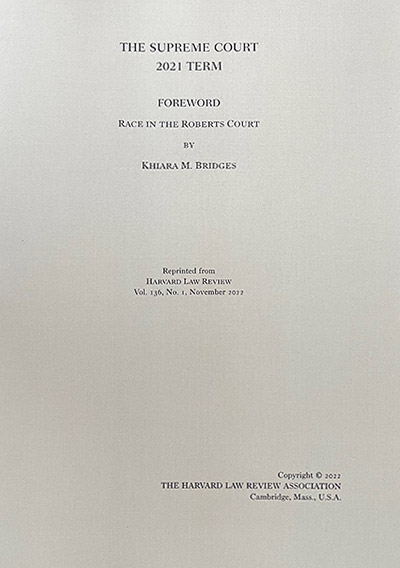
By Gwyneth K. Shaw
When Berkeley Law Professor Khiara M. Bridges got the coveted invitation to write the foreword of Harvard Law Review’s annual issue dedicated to the U.S. Supreme Court’s most recent term, she knew the abortion case Dobbs v. Jackson Women’s Health Organization would be a keystone of her argument.

It was November 2021, and the piece was due in July 2022. Bridges, whose constitutional law scholarship frequently involves reproductive rights, wanted the scope of her article to be broader, and she knew the Court’s 2021-2022 docket was stacked with potentially blockbuster cases. She was especially interested in New York State Rifle & Pistol Association, Inc. v. Bruen, a gun rights case with far-reaching implications.
But how to link the two? Bridges began by observing that advocates had used race to argue in favor of particular outcomes in both Dobbs and Bruen, and predicted the Court would ultimately use race to justify its decisions in both cases. As she worked, her connections became a sweeping critique of the Court since Chief Justice John Roberts took the helm in 2005: “Race in the Roberts Court.”
Bridges argues that the Roberts-led Court reaches far beyond the typical toolbox — particularly the equal protection clause — to address racial discrimination. In Dobbs, she writes, the majority invokes the due process clause to protect Black people from an alleged “genocide” perpetrated by abortion providers. Similarly, the Second Amendment is used in Bruen to save Black people from “what conservative actors have proposed is a racist disarmament that began in the Reconstruction Era South,” she writes.
The current Court majority, Bridges argues, only remedies racism against people of color when it encounters something that resembles the pre-civil rights era, from poll taxes to eugenics — and “only when the racism embedded in the challenged law or policy is so closely tied to white supremacy that it would be embarrassing for the Court to do nothing.”
This “common sense” tactic both allows the Court to do virtually nothing about persistent discrimination and maintain whatever is left of its legitimacy, she writes.
“When confronted with a claim of racial discrimination, the Roberts Court appears to be simply determining whether the alleged discrimination resembles what the country did in the pre–Civil Rights Era,” Bridges writes. “If the Court sees a resemblance between the present-day harm and the racism of yesteryear, the Court provides relief. If it sees no resemblance, it provides no relief.”
However, “[a] theory lies beneath the Roberts Court’s racial common sense,” she writes. “It is theory masquerading as no-theory.”
This is because when the justices consider allegations of discrimination against white people, Bridges writes, the bar is much lower.
“The Court finds racism when white people feel like they have been victims of racism, effectively exempting white claimants from having to show similarity between their alleged injuries and the injuries inflicted during the pre–Civil Rights Era,” she argues. “When one considers this in light of the Court’s willingness to remedy nonwhite claimants’ racial injuries only when they bring to mind the pre–Civil Rights Era — and when one considers that the Court has never thought nonwhite people’s feeling that they have been victims of racism answered the question of whether they have experienced a constitutionally relevant injury — one sees the depth of the inequality found in the Roberts Court’s jurisprudence.”
Pulling no punches
Unlike many academic and journalistic articles about the institution, “Race in the Roberts Court” is sharp and direct, tossing aside the typical euphemisms for pointed language and laser-cut observations.
Bridges calls the Court’s understanding of racism “woefully impoverished, and strategically so” and returns time and again to the vast gulf between its treatment of white claimants and claimants of color.
“It is is stunning that the Court stands ready and willing to recognize white people’s disappointed ‘expectations’ as a racial injury at the same time that it refuses to see that myriad forms of violence — from the forced births that the Court’s reversal of Roe greenlights to widespread voter disenfranchisement — are inflicting racial injuries on people of color,” she writes. “It is simply stunning.”

The tone and tenor of her analysis intensified over the course of the writing process, Bridges says. As she shared drafts of her work with Berkeley Law colleagues, including Dean Erwin Chemerinsky and Professors Russell Robinson and Ian Haney Lopéz, they told her she wasn’t being completely honest in characterizing the Court as unwitting in its treatment of race.
“Ian Haney Lopéz in particular told me that I’m more ‘intellectually courageous’ than that first draft was,” Bridges says. “Those conversations really sharpened my thinking, and also encouraged me to just take the gloves off. I don’t think we gain anything by acting like the Court doesn’t know what it’s doing — it knows exactly what it’s doing.
“I think we do ourselves a disservice when we pretend the Court is just an innocent bystander to the decisions that it’s turning out, to the docket it’s creating for itself.”
Bridges’ goal for her article went beyond highlighting the Court’s approach to race. She also wanted to alert constitutional law scholars working in different areas of the novel ways the current majority is reaching across amendments and doctrines to carve new avenues for decisions.
That approach meant broadening her own scholarship, with months spent finding, reading, and analyzing cases and research outside her typical sphere, from criminal procedure to election law.
“I think it’s important for race scholars not to get siloed. Race scholars need to read Bruen, they need to read Dobbs, they need to read cases I didn’t even discuss: First Amendment cases, cases about the administrative state,” she says. “Because when you read those cases, you’ll see just how inconsistent the Court is, and how it treats race in one area of law will be incredibly different from the way the Court will treat it in another area. And there’s nothing to explain the difference — except that this Court has been composed to realize the Republican Party’s vision of what the country ought to be.”
When she was tapped to write the foreword — an invitation, she says, that you don’t turn down — Harvard Law Review editors told her that these articles typically run about 36,000 words.
Her published article is close to 70,000.
“The journal gives you eight months in which you’re supposed to write the most brilliant thing that you’ve ever written in your life,” she says. “So it was pretty intense. But I’m really, really proud of the final product. And I was very happy to have such a huge platform to share my thoughts about what the Court is doing.”